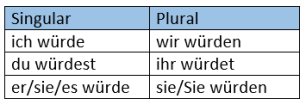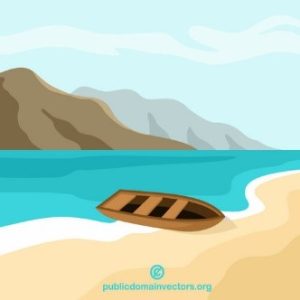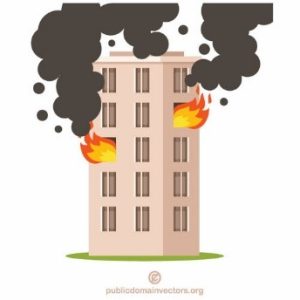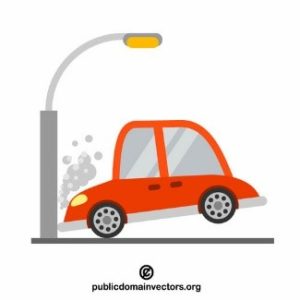18 Proficiency Interviews 5: Conditional, würden + infinitive
PI-5: Conditional: Würden + infinitive
To express something that is contrary to fact, you will use the verb würden. For example, if you would do something under the right circumstances, that is contrary to fact. In English, we use “would.”
- I would get rid of the trash, but there is no garbage can here.
- Ich würde den Müll entsorgen, aber es gibt hier keinen Mülleimer.

Notes:
- As always, when we have two verbs, German kicks the 2nd one to the end of the sentence or clause.
- The second verb will be in the infinitive form, i.e not conjugated.
- Ich and er/sie/es are conjugated exactly the same.
You can also use würden for polite requests:
- Würden Sie mir bitte das Menü geben? (Would you please give me the menu?)
- (Audio courtesy of SabineWanner, Creative Commons Attribution-Share Alike 3.0 Unported.)
Watch to see me reteaching würden.
Ex. B: Diskussion. Diskutieren Sie die folgenden Fragen.
- Würden Sie gern mal nach Deutschland reisen? Warum? Was würden Sie gerne in Deutschland machen?
- Welche deutschen Großstädte würden Sie gerne sehen? Oder würden Sie lieber kleine Dörfer besuchen?
- Würden Sie gern mal an einer deutschen Universität studieren? Wenn ja, in welcher Stadt?
- Würden Sie gern mal typisch deutsch essen? Wenn ja, welches Gericht würden Sie gern probieren?
- Würden Sie gern in Deutschland leben und arbeiten? Wenn ja, wo?

Ex. C: Würdest du lieber…? Ask your classmates what they would rather do?
A: Würdest du lieber nach Deutschland oder in die Schweiz reisen?
B: Ich würde lieber nach Deutschland reisen….usw.
To see a real-life experiment with Ex. C, watch Easy German’s video:
Ex. D: Was würden Sie in dieser Situation machen?
Listen to Blümchen’s song, Detektive, 2000, to hear examples of würden + infinitive:
Songtext: https://songmeanings.com/songs/view/3458764513820548532/

Ex. E: Listening Practice: Listen to someone telling about her hobbies. You will hear present tense, past tense, future tense, the comparative phrase “am liebsten,” and a würde-construction. Then answer the questions. Audio courtesy of Light Bulb Languages, (https://www.lightbulblanguages.co.uk/) .
Ex. F: Nicos Weg. Episode 61: Meine Familie. Watch the episode and do the online exercises. You will review der-word adjective endings, two-way prepositions, and family vocabulary. You may see a few ein-word adjective endings, which we will not do until chapter 7, but don’t worry too much about them for now if you get them wrong.
https://learngerman.dw.com/en/meine-familie/l-37661741
Ex. G: Nicos Weg. Episode 62: Meine Eltern. Watch the episode and do the online exercises. You will review family vocabulary and accusative pronouns, which you learned in Chapter 2.








